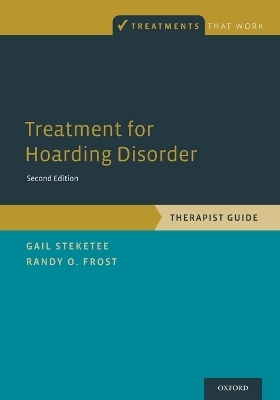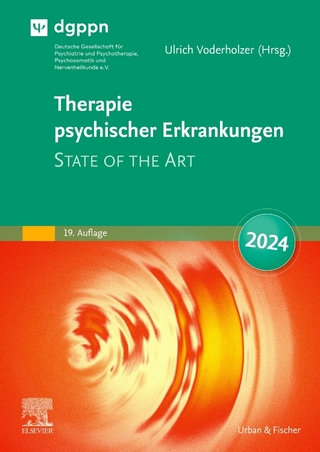
Treatment for Hoarding Disorder
Oxford University Press Inc (Verlag)
978-0-19-933496-4 (ISBN)
This Second Edition of Treatment for Hoarding Disorder is the culmination of more than 20 years of research on understanding hoarding and building an effective intervention to address its myriad components. Thoroughly updated and reflective of changes made to the Fifth Edition of the Diagnostic and Statistical Manual for Mental Disorders (DSM-5), this second edition of the Therapist Guide and accompanying client Workbook outlines an empirically supported and effective CBT program for treating hoarding disorder. This Therapist Guide is written for mental health clinicians-psychologists, social workers, psychiatrists, counsellors, and psychiatric nurses-to guide effective treatment of people with hoarding disorder. It provides numerous assessment and intervention forms to help clients use the methods described in the intervention. A major goal of the treatment is to recapture the positive role of possessions in the lives of people with hoarding problems, and strategies are outlined for sustaining gains and making further progress, as well as for managing stressful life events that can provoke problematic acquiring and difficulty discarding.
Dr. Gail Steketee is Dean and Professor at the Boston University School of Social Work. Her scholarly work has focused on developing and testing treatments for obsessive compulsive spectrum disorders, especially hoarding symptoms in recent years. Dr. Steketee has published over 200 articles and chapters, and over a dozen books on these topics, including therapist guides, client workbooks, edited volumes, and self-help books on hoarding and related conditions. She gives frequent lectures, workshops, and media interviews on hoarding and related conditions to professional and public audiences in the U.S. and abroad. Dr. Randy O. Frost is the Israel Professor of Psycholo at Smith College and an international expert on hoarding a related phenomena. He has published over 150 scientific articles and book chapters on these topics. Dr. Frost has co-authored several books on hoarding and was awarded the Lifetime Achievement Award for excellence in innovation, treatment, and research in the field of hoarding and cluttering by the Mental Health Association of San Francisco. He gives frequent lectures, workshops, and media interviews on the topic of hoarding a related conditions.
Chapter 1 Introduction to Hoarding Disorder ; Chapter 2 Evidence-based Treatment for Hoarding Disorder ; Chapter 3 Assessing Hoarding ; Chapter 4 Case Formulation ; Chapter 5 Enhancing Motivation ; Chapter 6 Planning Treatment ; Chapter 7 Reducing Acquiring ; Chapter 8 Training Skills ; Chapter 9 Making Decisions about Saving and Discarding ; Chapter10 Cognitive Strategies ; Chapter 11 Complications in the Treatment of Hoarding Disorder ; Chapter 12 Maintaining Gains ; Appendix Forms and Assessments ; 1. Clinician Session Form ; 2. Hoarding Interview ; 3. Hoarding Rating Scale ; 4. Saving Inventory - Revised (SI-R) ; 5. Clutter Image Rating (CIR) ; 6. Saving Cognitions Inventory (SCI) ; 7. Activities of Daily Living for Hoarding (ADL-H) ; 8. Safety Questions ; 9. Home Environment Inventory (HEI) ; 10. Scoring keys for assessment instruments ; 11. Blank Model of Hoarding ; 12. Brief Thought Record ; 13. Acquiring Form ; 14. Clutter Visualization Form ; 15. Unclutter Visualization Form ; 16. Acquiring Visualization Form ; 17. Practice Form ; 18. Thought Record ; 19. Instructions for Coaches ; 20. Family Response to Hoarding Scale (FRHS) ; References ; Readings and Resources ; About the Authors ; Index
| Reihe/Serie | Treatments That Work |
|---|---|
| Verlagsort | New York |
| Sprache | englisch |
| Maße | 251 x 175 mm |
| Gewicht | 499 g |
| Themenwelt | Geisteswissenschaften ► Psychologie ► Klinische Psychologie |
| Medizin / Pharmazie ► Medizinische Fachgebiete ► Psychiatrie / Psychotherapie | |
| ISBN-10 | 0-19-933496-X / 019933496X |
| ISBN-13 | 978-0-19-933496-4 / 9780199334964 |
| Zustand | Neuware |
| Haben Sie eine Frage zum Produkt? |
aus dem Bereich


